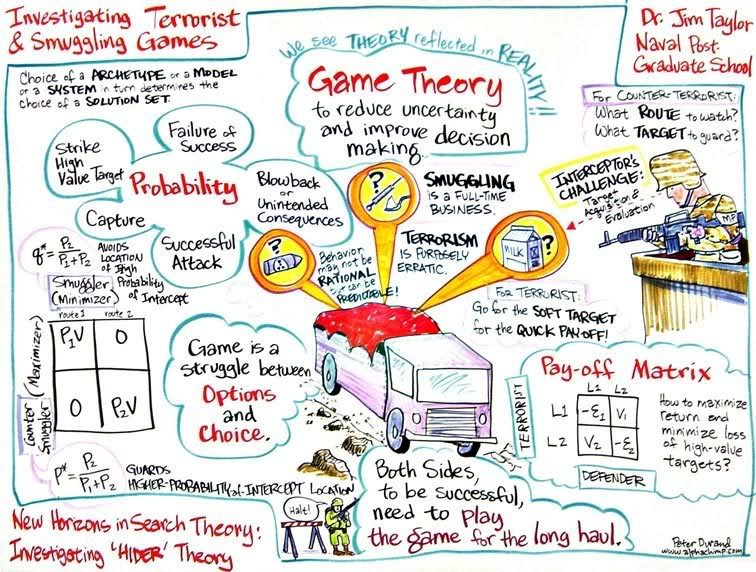
Here is a great article from A Second Hand Conjecture that pulls together game theory and the use of the media in relation to the insurgency and counter-insurgency in Iraq.
Witty and topical observations of our globalized world, geography, politics, and life in general.

Democratic presidential hopeful Barack Obama said Thursday the United States cannot use its military to solve humanitarian problems and that preventing a potential genocide in Iraq isn't a good enough reason to keep U.S. forces there.
"Well, look, if that's the criteria by which we are making decisions on the deployment of U.S. forces, then by that argument you would have 300,000 troops in the Congo right now — where millions have been slaughtered as a consequence
of ethnic strife — which we haven't done," Obama said in an interview with The Associated Press.
"We would be deploying unilaterally and occupying the Sudan, which we haven't done. Those of us who care about Darfur don't think it would be a good idea," he said.
What Obama did was commit the Tu Quoque fallacy. When confronted with possibility of genocide in Iraq, Obama turns the focus to the uninhibited ethnic strife in the Congo as if it where justification to the outcome of his plan. Here is the simplified version of the argument that Obama is making to help point out the fallacy:
See how the argument does not make sense, it doesn't address the issue. In other words, when people claim "Obama's plan will cause genocide", Obama responds "you already allow for genocide." That's not a suitable answer.
 Bono, with the support of Hollywood and his 'One' campaign, has always been on the forefront of the African aid issue. There is no need to debate Bono's intentions, he comes across as honestly wanting to help the African peoples (Bono, surprisingly articulate, does makes a very persuasive argument). But there are a number of people out there --such as my self--who say he is not really helping, in fact, he is only harming Africa. These critics claim the West should be focusing on helping the Africans nurture their own wealth instead of giving them hand-outs. In a recent Los Angeles Times article, William Easterly writes:
Bono, with the support of Hollywood and his 'One' campaign, has always been on the forefront of the African aid issue. There is no need to debate Bono's intentions, he comes across as honestly wanting to help the African peoples (Bono, surprisingly articulate, does makes a very persuasive argument). But there are a number of people out there --such as my self--who say he is not really helping, in fact, he is only harming Africa. These critics claim the West should be focusing on helping the Africans nurture their own wealth instead of giving them hand-outs. In a recent Los Angeles Times article, William Easterly writes:The real Africa needs increased trade from the West more than it needs more aid handouts. A respected Ugandan journalist, Andrew Mwenda, made this point at a recent African conference despite the fact that the world's most famous celebrity activist — Bono — was attempting to shout him down. Mwenda was suffering from too much reality for Bono's taste: "What man or nation has ever become rich by holding out a begging bowl?" asked Mwenda.An article written by Jennifer Brea at American.com gives a great analysis on the issue:
For the thousands of foreign-educated lawyers, businessmen, and architects from the Diaspora who are leaving cushy corporate jobs to return home with their skills and their dynamism to open businesses, it's about creating wealth, not reducing poverty. Africa is not a victim in need of saving: it's a land of opportunity.She goes on to write:
We can continue the endless cycle of need and dependency, or you can create jobs, develop indigenous capacity, and build a sustainable future.The overall message:
Aid not only crowds out local entrepreneurship, it makes governments lazy and deprives countries of the incentive to build effective institutions. Public revenue derived from taxes makes governments directly responsible to their citizens. Free money builds white elephants and bloated bureaucracies, it being far easier to create new government jobs than implement policies to fight unemployment, especially when someone else is footing the bill.
Aid can alleviate immediate misery and that is why we love it. Charity is a profoundly human response to all those images that pull on our heartstrings. But all evidence points to the maddening conclusion that, in the long run, aid not only has no positive effect on economic growth, it may even undermine it.
Does this mean the West should stop helping Africa? Absolutely not. One of the major problems in Africa, notably in Sudan, are the corrupt governments. Free markets can go only go so far, the political environment must be free also for any true change to occur. Bono's plan to keep aid going only perpetuates the problem of corrupt governments and impoverished Africans. The West has an opportunity to intervene in situations such as the Sudan and break the chains of exploitive, violent governments so the African people can go on to help themselves.
UPDATE: I soon as I was done writing this post, I took a gander at Thomas Barnett's blog and found this interesting post.
I am always interested in time lapse film, especially of places I hope to someday visit. Here are two clips I've come across that were amazing. The first one is of Tokyo and the second is of Antarctica.
Warning: Dramatic Graphic Violence
The clip above is an advertisement that airs on Al-Arabiya TV denouncing Sunni-Shiite Terrorism in Iraq.
There was a New York Times editorial recently, The Road Home, that rattled my sense of logic and common sense. The premise of the article is that it is time for the United States to leave Iraq. This is the some of the usual rhetoric that is heard in most news coverage, but then the article goes into what happens if the US were to leave:
I agree with the analysis above, no argument there. But then the article goes on to say:That conversation must be candid and focused. Americans must be clear that Iraq, and the region around it, could be even bloodier and more chaotic after Americans leave. There could be reprisals against those who worked with American forces, further ethnic cleansing, even genocide. Potentially destabilizing refugee flows could hit Jordan and Syria. Iran and Turkey could be tempted to make power grabs. Perhaps most important, the invasion has created a new stronghold from which terrorist activity could proliferate.
But Americans must be equally honest about the fact that keeping troops in Iraq will only make things worse. The nation needs a serious discussion, now, about how to accomplish a withdrawal and meet some of the big challenges that will arise.
In other words, if the US stays it will get "worse." If the US leaves, Iraq will become a bloodier, more chaotic stronghold of terrorism and genocide which will probably devolve into a regional war. How is staying in Iraq "worse" than latter option? This doesn't make sense, if anything this should be an argument for why we SHOULD stay.
What is most interesting is the fact that people recognize that pulling troops from Iraq can lead to ethnic cleansing or genocide, but believe US should leave anyways. Yet, many of the same people turn around and say the US should intervene and stop the genocide in Darfur (the Democratic Debate anyone?). I agree the US (the help of NATO and the UN would be great too) should intervene in Darfur, but why shouldn't the US also stay and prevent a future Darfur-like situation in Iraq?
This excellent clip on nuclear weapons comes from GOOD Magazine. It sums up a great deal information with the use of graphics and vintage news clips. Plus, it uses one of my favorite RATATAT songs, "Gettysburg."
 With the recent Live Earth concert and the continuous trend in "global warming awareness", light has been brought to the radical alarmist position many environmentalists and, now, quickly, the average person is taking on the issue. Many scientists and/or environmentalists have become very dogmatic in their belief that global warming is real and is an effect of human industrialism. I would liken this unquestionable belief in global warming to those who believe in radical Islam. Like the demonizing of non-believers in radical Islam, if one questions the validity of global warming they are called out as 'moron' or 'a corporate shill.' Moreover, the people who publicly question global warming are treated with disdain and are often shunned by the scientific community. For example, notable climatologist Timothy Ball who came out in being skeptical of the degree to which humans were affecting the climate has received numerous death threats.
With the recent Live Earth concert and the continuous trend in "global warming awareness", light has been brought to the radical alarmist position many environmentalists and, now, quickly, the average person is taking on the issue. Many scientists and/or environmentalists have become very dogmatic in their belief that global warming is real and is an effect of human industrialism. I would liken this unquestionable belief in global warming to those who believe in radical Islam. Like the demonizing of non-believers in radical Islam, if one questions the validity of global warming they are called out as 'moron' or 'a corporate shill.' Moreover, the people who publicly question global warming are treated with disdain and are often shunned by the scientific community. For example, notable climatologist Timothy Ball who came out in being skeptical of the degree to which humans were affecting the climate has received numerous death threats.